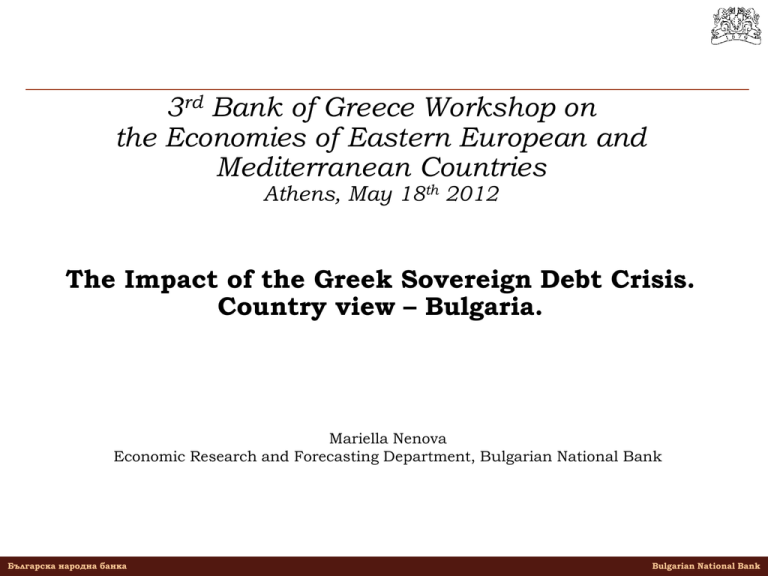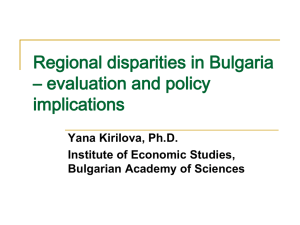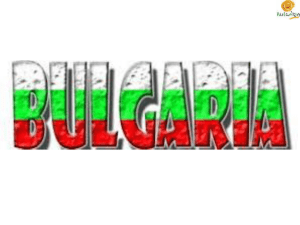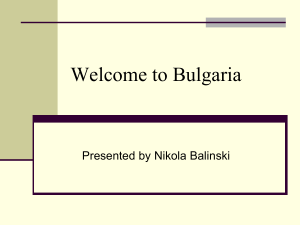18-5-2012_Mariella_Nenova
advertisement

3rd Bank of Greece Workshop on the Economies of Eastern European and Mediterranean Countries Athens, May 18th 2012 The Impact of the Greek Sovereign Debt Crisis. Country view – Bulgaria. Mariella Nenova Economic Research and Forecasting Department, Bulgarian National Bank Българска народна банка Bulgarian National Bank Outline • Economic and financial links between Greece and Bulgaria: • Developments during the global economic crisis and current trends • Conclusions 2 Българска народна банка Bulgarian National Bank GDP Growth by Components Growth rate in % GDP Private consumption Public consumption Gross fixed capital formation Exports of goods and services Imports of goods and services BULGARIA 2009 2010 -5.5 0.4 -7.6 0.1 -6.5 1.9 -17.6 -18.3 -11.2 14.7 -21 2.4 2011 1.7 -0.6 0.5 -9.7 12.8 8.5 2012* 0.5 0.6 0.8 -2.2 3.3 2.7 2013* 1.9 1.9 1.6 3.6 5.2 5.6 Growth rate in % GDP Private consumption Public consumption Gross fixed capital formation Exports of goods and services Imports of goods and services GREECE 2009 2010 -3.3 -3.5 -1.3 -3.6 4.8 -7.2 -15.2 -15 -19.5 4.2 -20.2 -7.2 2011 -6.9 -7.1 -9.1 -20.7 -0.3 -8.1 2012* -4.7 -5.7 -11 -6.6 3.2 -5.1 2013* 0 -1.1 -9.5 6.7 5.4 0 *European commission forecast, spring 2012 Source: Eurostat Българска народна банка 3 Bulgarian National Bank Economic and Financial Links between Greece and Bulgaria 4 Българска народна банка Bulgarian National Bank Foreign Trade and Tourism • Greece is among the five most important trading partners of Bulgaria – in 2011 7% of Bulgarian exports were directed to and 5% of Bulgarian imports originated from Greece in 2011. • Tourism between Bulgaria and Greece is well developed – in 2011 Greek tourists were 13% of the total number of tourists who visited Bulgaria. • The total inflow of income and current transfers from Greece to Bulgaria has been in the range of EUR 70-80 million (for the 2006-2011 period) around 7% of the total. 5 Българска народна банка Bulgarian National Bank Foreign Direct Investment from Greece to Bulgaria • In the pre-crisis years around 10% of total FDI inflow to Bulgaria originated from Greece. At the end of 2011 the share of Greece in the stock of FDI amounted to 8%. Financial intermediation accounts for close to half of it (47.5% as of March 2012). The Banking Sector • The share of Greek banks assets in the total amount of assets of the Bulgarian banks was 24% at the end of 2011 decreasing from 29% at the end of 2008. 6 Българска народна банка Bulgarian National Bank Developments during the Global Economic Crisis and Current Trends 7 Българска народна банка Bulgarian National Bank Foreign Trade • Exports of Bulgaria to Greece proved to be resilient and recorded a positive growth rate despite the negative real growth rate in Greece in the period 2008 - 2011. After the worldwide drop in foreign trade at the end of 2008 the recovery of Bulgarian exports to Greece was in line with the overall Bulgarian export growth. 8 Българска народна банка Bulgarian National Bank Exports of Bulgaria to Greece (annual nominal growth rate in %) Share of Bulgaria in Greece's imports 3 40 30 2.5 20 2 % % 10 0 1.5 -10 1 -20 2011 2010 2009 2008 2007 2006 2005 2004 2003 2002 -30 2001 2011 2010 2009 2008 2007 2006 2005 2004 2003 2002 2001 0.5 Exports to Greece Source: BNB, Eurostat Българска народна банка Total exports of Bulgaria 9 Bulgarian National Bank Structure of Bulgarian Exports to Greece in 2008 Investment goods 3.9% Mineral fuels, oils and electricity 18.2% Consumer goods 25.1% Structure of Bulgarian Exports to Greece in 2011 Investment Mineral fuels, oils and electricity 13.9% goods Consumer goods 30.9% 5.4% Raw materials 52.8% Source: BNB Българска народна банка Raw materials 49.7% 10 Bulgarian National Bank Structure of Bulgarian Imports from Greece in 2008 Investment Mineral fuels, oils and electricity 10.3% Consumer goods 16.0% goods 10.1% Raw materials 63.5% Source: BNB Българска народна банка Structure of Bulgarian Imports from Greece in 2011 Mineral fuels, oils and electricity Investment 12.2% goods 6.9% Consumer goods 26.5% Raw materials 54.2% 11 Bulgarian National Bank Characteristics of Bulgaria’s Trade Relations with Greece 60 50 40 30 20 10 0 2007 Trade intensity index 2008 2009 Trade complementarity index Source: WITS Note: The indices are based on HS 6-digit level data Българска народна банка 2010 12 Bulgarian National Bank Commodity Structure of Foreign Trade between Bulgaria and Greece – raw materials • The predominant part of Bulgaria’s exports to Greece consists of raw materials – metals and raw materials for the food industry. • Greece’s exports of non-ferrous metals seem to be correlated with Greece’s imports of non-ferrous metals. That’s why the drop in domestic demand in Greece should not have a substantial effect on Bulgaria’s exports of non-ferrous metals. 13 Българска народна банка Bulgarian National Bank Greece’s Exports of Non-ferrous Metals vs. Imports of Non-ferrous Metals 1800 1600 Million euro 1400 1200 1000 800 600 400 200 Greece's exports of non-ferrous metals Source: Eurostat Българска народна банка 2011 2010 2009 2008 2007 2006 2005 2004 2003 2002 2001 0 Greece's imports of non-ferrous metals 14 Bulgarian National Bank Share of Bulgarian Imports in Greece’s Total Imports of Non-ferrous Metals 25 20 % 15 10 5 Source: Eurostat Българска народна банка 2011 2010 2009 2008 2007 2006 2005 2004 2003 2002 2001 0 15 Bulgarian National Bank Tourism • In 2009 the growth rate of the number of Greek tourists visiting Bulgaria remained positive, while the total number of tourists in Bulgaria declined • In the following years up to 2011 the growth rate of this indicator remained above the average growth of the number of tourists visiting Bulgaria 16 Българска народна банка Bulgarian National Bank Share of Greek Tourists in the Total Number of Tourists Visiting Bulgaria Tourists Visiting Bulgaria (annual growth rates in %) 40 14 35 30 13 25 20 % % 12 11 15 10 5 10 0 -5 9 -10 2011 2010 2009 2008 2007 2006 2011 2010 2009 2008 2007 2006 2005 2004 2005 -15 8 Total number of tourists visiting Bulgaria Number of Greek tourists visiting Bulgaria Source: National Statistical Institute 17 Българска народна банка Bulgarian National Bank International Investment Position of Bulgaria with Greece since 2009 • The share of assets of Bulgarian residents in Greece in Bulgarian residents’ total foreign assets has been less than 2% and is slightly declining. • The share of liabilities of Bulgarian residents to Greece in total Bulgarian residents’ foreign liabilities has fallen down from around 12% in 2008 to 8% in 2011. • The stock of FDI from Greece as a percent of total stock of FDI declined only slightly in 2010-2011 period. • Close to half of FDI stock originating from Greece is invested in sector Financial intermediation and its absolute value remains stable. 18 Българска народна банка Bulgarian National Bank Million euro International Investment Position of Bulgaria with Greece 7000 14% 6000 12% 5000 10% 4000 8% 3000 6% 2000 4% 1000 2% 0 0% 2007 2008 2009 2010 2011 Assets of Bulgarian residents in Greece Liabilities of Bulgarian residents to Greece Share of Greece in total assets of Bulgarian residents (rh) Share of Greece in total liabilities of Bulgarian residents (rh) Source: BNB Българска народна банка 19 Bulgarian National Bank Share of Greece in the total stock of FDI in Bulgaria 10 9 8 7 % 6 5 4 3 2 1 0 2005 Source: BNB Българска народна банка 2006 2007 2008 2009 2010 2011 20 Bulgarian National Bank FDI stock by industry (1999-2011) • Overall • From Greece Real estate, renting and Electricity, gas and water supply 4.7% Other 5.1% Construction 7.6% business Real estate, renting and business activities 22.1% activities Manufacturing Wholesale and retail trade 13.3% Source: BNB Българска народна банка 3.2% 5.0% Financial 9.7% Transport 12.7% Other intermediation 47.5% Wholesale Financial intermediation 17.7% Manufacturing 16.8% trade 16.4% Transport 18.2% 21 Bulgarian National Bank Stock of FDI in Bulgaria originating from Greece 3500 3000 Million euro 2500 2000 1500 1000 500 0 2006 2007 2008 Financial intermediation Source: BNB Българска народна банка 2009 2010 2011 Total 22 Bulgarian National Bank The Banking Sector • The overall macroeconomic stability of Bulgaria is maintained based on the countercyclical policy of the Bulgarian National Bank, the strong supervision, the stable banking system and the prudent fiscal policy. • The Bulgarian banking sector is one of the few banking systems in Europe where no bank needed to be rescued by the State. No taxpayers’ money was spent in support of the financial industry. • The confidence of domestic depositors in the stability of the banking system is high – by the end of March 2012 the deposits of households increased year on year by 13.3% (a growth rate largely maintained since 2010). • The banking system is very liquid and capable to pay back debt to foreign-parent banks. Gradually the dependence on attracted resources from external sources has been reduced. At the end of March 2012 less than 13% of total attracted resources comes from foreign parent banks, compared to almost one fourth at the end of 2008. 23 Българска народна банка Bulgarian National Bank The Banking Sector Market shares (% of assets, March 2012): subsidiaries of EU banks: 68.4% 72.7% branches of banks licensed in the EU: 4.3% Bulgarian-owned banks: 25% Subsidiaries & Branches of non-EU parents: 2.3% Banking System Indicators (%) % 2008 2009 2010 2011 March 2012 Return on assets (ROA) 2.12 1.08 0.84 0.63 0.91 Return on equity (ROE) Capital adequacy Tier I capital adequacy NPL net (more than 90 days overdue) Liquidity (LAR) Credit Growth (y-o-y) 20.26 14.93 11.16 8.95 17.04 14.03 6.55 17.39 15.16 4.93 17.55 15.73 6.96 17.52 15.84 1.63 21.65 32.2 4.14 21.9 4.5 8.02 24.35 2.7 9.6 25.53 4.09 10.71 25.75 3.72 24 24 of 13 Българска народна банка Bulgarian National Bank The Greek Banking Groups Subsidiaries in Bulgaria • The Greek banking groups presence in Bulgaria is by subsidiaries. There is only one branch of a Greek bank with a negligible market share in Bulgaria. • The subsidiaries operate under the strict banking supervision of the BNB and they are required to abide by the domestic prudential regulations and standards, which are more conservative than those in the euro area. • The shareholders have confirmed their long-term interest in Bulgaria and the strategic nature of the Bulgarian market. • After rapid credit expansion in the 2004-2008 period the market share of the Greek banking groups subsidiaries peaked up to 29% in 2008 and remained stable at 28% in 2009 – 2010. • In 2011 their market share has declined to the current level of 24%. 25 Българска народна банка Bulgarian National Bank Subdued Risks to the Greek Banking Groups Subsidiaries: • The Greek banking groups subsidiaries in Bulgaria are well capitalized. • While the overall level of the subsidiaries’ attracted funds has been gradually declining in 2011, the households’ confidence in them has been preserved and the households’ deposits stay stable (stable core deposit base). • The subsidiaries are liquid and at the background of weak domestic demand for credit they allocate the excess liquidity to pay back their debt to the parent–banks. Since the parental funding was extended in the credit boom years in order to gain market share in Bulgaria by strong credit growth, the repayment of debt does not endanger the liquidity position of the subsidiaries. 26 Българска народна банка Bulgarian National Bank Financial Markets • There are no contagion effects from the Greek debt crisis to the financial market in Bulgaria. • Interest rates in Bulgaria have started to decline shortly after the outburst of the global crisis. • Long term interest rates on Bulgarian government securities are also on a declining trend. • The CDS spreads on Bulgarian government debt move in correlation with the overall market sentiments. 27 Българска народна банка Bulgarian National Bank Interbank Money Market (Overnight Interest Rate - LEONIA) 7 6 5 4 % 3 2 1 0 -1 -2 2008 2009 Spread (Leonia-Eonia) 2010 2011 LEONIA 2012 EONIA 28 Българска народна банка Bulgarian National Bank Interbank Money Market (3 m Interest Rate - (Sofibor) 8 7 6 % 5 4 3 2 1 0 2008 2009 2010 Spread (Sofibor (3m) - Euribor (3 M) 2011 Sofibor (3 m) 2012 Euribor (3м) 29 Българска народна банка Bulgarian National Bank CDS spreads and interest rates in Bulgaria up to 600 as of May '12 14 12 % 10 8 6 4 2 0 2008 2009 2010 2011 2012 BG Credit Swap 5Yr Spread (Mid)(%) GR Credit Swap 5Yr Spread (Mid)(%) BG Long-term interest rate BG Corporate lending rate (new business) Source: BNB, JP Morgan Българска народна банка 30 Bulgarian National Bank Conclusions • The spill over effects from the Greek economic growth developments to the Bulgarian economy seem rather weak. • The process of paying back liabilities to parent banks by the Greek banking groups subsidiaries, operating in Bulgaria, is smooth, it does not endanger their liquidity or solvency position. • The Bulgarian banking system as a whole remains resilient, well capitalized and stabile, benefiting from the high level of confidence of depositors. • Interest rates in Bulgaria exhibit a declining trend and low volatility. 31 Българска народна банка Bulgarian National Bank THANK YOU FOR THE ATTENTION! Българска народна банка Bulgarian National Bank







